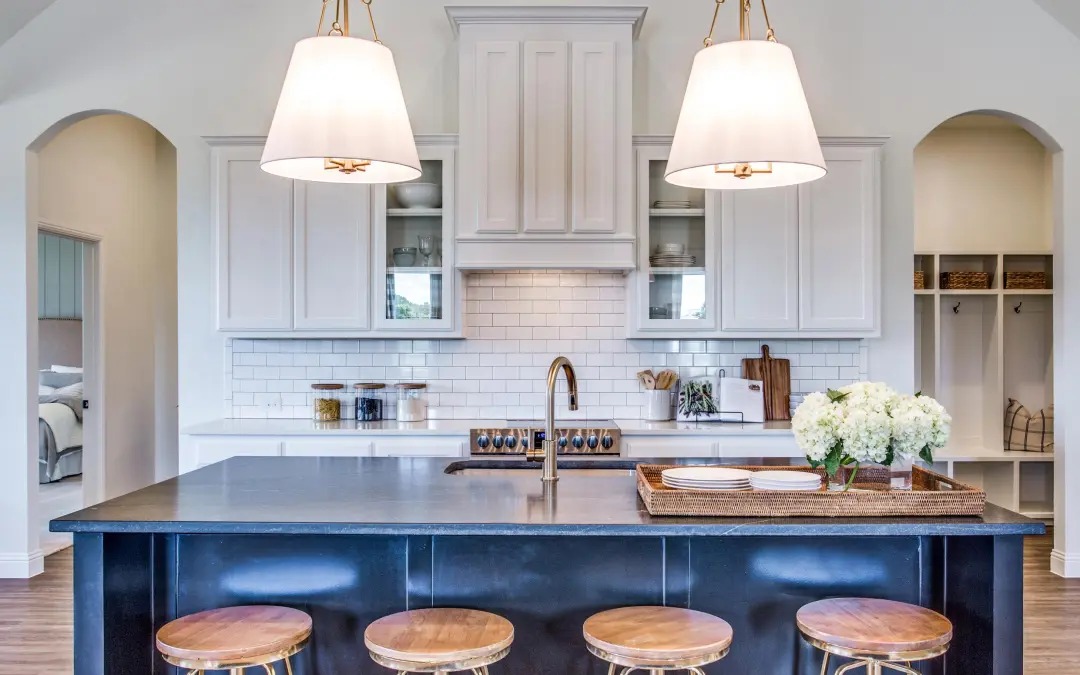Choosing the right countertops for your kitchen is an essential decision in the overall design and functionality of the space. Your countertops will play a significant role in how your kitchen looks, feels, and operates on a daily basis. Here’s what you should know to make an informed decision:
1. Consider Your Budget
Countertops come in a wide range of price points, so it’s important to set a budget before you start shopping. Some materials, like granite or marble, can be expensive, while others, like laminate or butcher block, are more budget-friendly. Here’s a breakdown of some popular options:
- Budget-friendly: Laminate, butcher block, concrete, tile
- Mid-range: Quartz, solid surface, granite
- High-end: Marble, exotic granite, soapstone, and high-end quartz
2. Durability and Maintenance
Your kitchen countertops need to be durable enough to withstand daily wear and tear. Different materials have varying levels of durability and maintenance requirements:
- Granite: Extremely durable and heat-resistant, but it requires sealing to prevent stains and bacteria buildup.
- Quartz: Non-porous and requires no sealing, making it easy to maintain. It’s also resistant to scratches, heat, and stains.
- Marble: Beautiful but porous and prone to scratching and staining. It requires regular sealing and careful maintenance.
- Butcher Block: Requires periodic oiling to maintain its beauty and protect it from moisture. It’s prone to scratches but can be sanded and refinished.
- Concrete: Durable and customizable but can be prone to cracking and staining if not properly sealed.
- Laminate: Affordable and easy to clean but less durable than stone materials. It can scratch and scorch more easily.
3. Aesthetics and Style
Countertops are one of the most visible elements in the kitchen, so choosing a material that complements your style is essential. Consider how your countertops will fit with your cabinetry, flooring, and overall aesthetic:
- Natural Stone (Granite, Marble, Soapstone): Perfect for a luxurious, high-end look. Granite and marble come in a variety of colors and patterns, while soapstone has a unique, matte finish.
- Quartz: Available in a wide range of colors and patterns, including options that mimic natural stone. It’s a great choice if you want the beauty of stone with more consistent patterns.
- Butcher Block: Adds warmth and a natural, rustic feel to the kitchen. Ideal for a farmhouse or cottage-style kitchen.
- Laminate: Available in many colors, textures, and finishes. It can mimic the look of natural stone, wood, or even concrete but with a more budget-friendly price tag.
- Concrete: Provides a modern, industrial look and can be customized with stains and textures for a unique feel.
4. Functionality and Use
Consider how you use your kitchen and how the countertops will serve those needs:
- Cooking: If you do a lot of meal prep, you’ll need a durable, heat-resistant surface. Granite and quartz are great options because they can handle hot pans and are easy to clean.
- Entertaining: If you frequently entertain, you might want a surface that’s easy to clean and won’t stain easily. Quartz is an excellent option because it resists stains and scratches.
- Slicing and Chopping: If you prefer to cut directly on your countertops, butcher block is a great option, but be aware that it will require maintenance over time.
5. Seamless Design
Consider whether you want seams to be visible or seamless. Some materials, like quartz and solid surface, can be installed with minimal seams for a sleek, uninterrupted look. Other materials, like granite or marble, may have visible seams depending on the layout and size of the countertop.
6. Installation and Repairs
Some materials require professional installation, which can increase the overall cost of your countertops. Additionally, some materials are easier to repair than others:
- Quartz: While it’s durable, repairing quartz can be challenging if it gets cracked or chipped.
- Granite and Marble: These stones are durable, but cracks can occur. While repairs are possible, it often requires a professional.
- Laminate: Can be a DIY-friendly option, but repairs may be difficult and noticeable if damaged.
- Butcher Block: Can be sanded and refinished if it gets scratched or damaged, but it will require regular maintenance.
7. Sustainability
If sustainability is important to you, look for countertops made from environmentally friendly materials:
- Recycled Materials: Some countertops are made from recycled glass, paper, or even recycled stone, offering an eco-conscious option.
- Butcher Block: If sourced sustainably, butcher block can be an environmentally friendly option, as wood is a renewable resource.
- Quartz: Many quartz manufacturers use recycled materials in their products, making it a more sustainable option compared to natural stone.
8. Edge Styles
Countertop edges come in various shapes, and the right one can make a big difference in the overall aesthetic of your kitchen:
- Straight Edge: Simple and modern, perfect for minimalist or contemporary kitchens.
- Bullnose Edge: A rounded edge that’s softer and safer for families with kids.
- Beveled Edge: A sharp, angled edge that adds a sleek, sophisticated look.
- Eased Edge: A subtle, slightly rounded edge that works with most kitchen styles.
Each edge style can alter the feel of your kitchen, so choose one that complements your design.
9. Long-Term Value
Think about how long you want your countertops to last and how they will affect the resale value of your home. High-end materials like granite and quartz are often seen as desirable features that can increase home value, while laminate may not add as much value but is an affordable choice.
10. Heat Resistance and Stain Resistance
Some countertops, like granite and quartz, are highly heat-resistant, making them a great option for cooking-heavy kitchens. However, marble and butcher block are more prone to heat damage, and some materials, like granite, may stain if not sealed properly. If you’re worried about stains, materials like quartz or solid surface are good choices because they are non-porous.
11. Consider the Long-Term Care
Each material comes with its own care requirements. Here’s a quick rundown:
- Granite: Requires periodic sealing to maintain its resistance to stains.
- Marble: Needs regular sealing and careful attention to avoid staining and etching from acidic foods.
- Quartz: Low maintenance; just wipe with a damp cloth.
- Butcher Block: Needs periodic oiling to prevent drying out and water damage.
- Concrete: Needs sealing to prevent stains, and it’s more susceptible to chipping than other materials.
Conclusion
Choosing the right countertops for your kitchen involves balancing aesthetics, functionality, durability, and budget. Think about how you use your kitchen, how much maintenance you’re willing to do, and the look you want to achieve. With the right countertop material, your kitchen will not only be a beautiful place to cook and gather but also a space that serves your needs for years.

